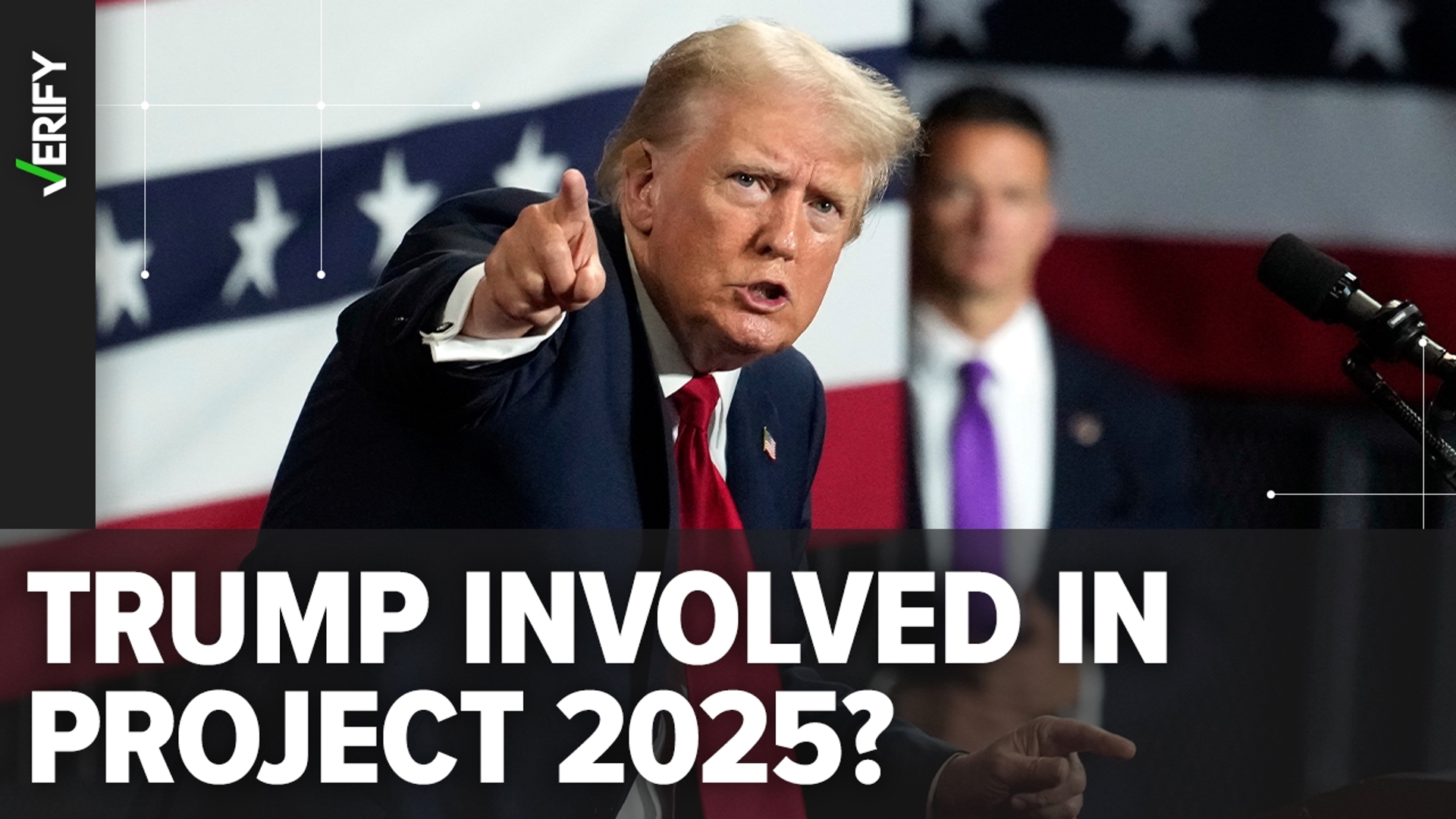The Trump Administration's First 100 Days: A Comparison With Project 2025 And Future Implications

Table of Contents
Key Policy Initiatives of Trump's First 100 Days
Trump's first 100 days were characterized by a flurry of executive actions aimed at fulfilling campaign promises. These initiatives broadly fell under the categories of economic policy, immigration, and judicial appointments.
Deregulation and Economic Policy
A central theme of the Trump administration's early days was deregulation and economic stimulus. This involved significant efforts to roll back Obama-era regulations and renegotiate international trade agreements.
- Tax Cuts: The administration pushed for significant tax cuts, arguing they would stimulate economic growth. The Tax Cuts and Jobs Act of 2017, passed later in the year, represented a major legislative achievement in this area.
- Withdrawal from the Trans-Pacific Partnership (TPP): Trump fulfilled a campaign promise by withdrawing the United States from the TPP, a multinational trade agreement. This signaled a shift towards bilateral trade deals and a more protectionist stance.
- Deregulation Efforts: Across various sectors – environmental, financial, and healthcare – the administration initiated efforts to reduce regulations, arguing they stifled business growth and innovation. These actions often faced legal challenges and significant public opposition.
The immediate impact of these policies was debated, with supporters pointing to increased economic growth and job creation, while critics highlighted potential negative consequences for environmental protection and worker rights. Project 2025's economic proposals largely aligned with these initial moves, advocating for further deregulation and tax cuts to boost economic activity. The long-term effects remain a subject of ongoing analysis and scholarly debate.
Immigration and Border Security
Immigration and border security became a defining issue during Trump's first 100 days. The administration prioritized border wall construction, stricter immigration enforcement, and implemented a controversial "travel ban" restricting entry from several Muslim-majority countries.
- Executive Orders: Several executive orders addressed immigration enforcement, including measures to increase deportations and strengthen border security.
- Legal Challenges: These policies faced immediate and sustained legal challenges, with courts issuing injunctions against certain provisions of the travel ban.
- Public Reaction and Political Fallout: The administration's approach to immigration sparked widespread protests and intense political polarization, shaping the national conversation for years to come.
Project 2025's immigration platform strongly supported stricter border controls and more restrictive immigration policies. While Trump's actions largely reflected these aims, the implementation faced significant obstacles, highlighting the complexities of translating ambitious policy goals into effective legislation and practice.
Appointments and Judicial Nominees
A defining feature of Trump's first 100 days was the rapid pace of appointments to key government positions, including federal judges and Supreme Court justices.
- Key Appointments: The administration moved quickly to fill vacancies in various federal agencies and courts, installing individuals aligned with its conservative ideology.
- Confirmation Processes: The confirmation process for these nominees often became highly contentious, reflecting partisan divisions within the Senate.
- Impact on the Judiciary and Policy Direction: These appointments significantly shaped the direction of the judiciary, potentially impacting future legal interpretations and policy outcomes for decades to come.
Project 2025 emphasized the importance of appointing conservative judges who would uphold traditional values and interpret the Constitution according to their principles. Trump's judicial appointments largely reflected this agenda, securing a lasting legacy on the composition and ideological leanings of the judiciary.
Project 2025: A Blueprint for Conservative Governance
Project 2025 served as a roadmap for conservative policy goals, providing a framework for potential legislative initiatives and executive actions.
Policy Overlap and Divergence
Project 2025 provided detailed policy recommendations across numerous areas, including healthcare, energy, and foreign policy. While Trump's initial actions generally aligned with the overarching conservative principles of Project 2025, some notable discrepancies existed.
- Areas of Alignment: There was significant congruence regarding deregulation, tax cuts, and a more protectionist trade policy.
- Areas of Divergence: Specifics in healthcare reform and the approach to foreign policy showed some divergence between the blueprint and actual implementation. Unexpected events and political realities often dictated departures from the initial plan.
The discrepancies highlighted the inherent challenges of translating broad policy goals into concrete legislative and executive action, illustrating the limitations of even the most carefully crafted policy blueprints.
Influence on Trump's Agenda
While the extent of Project 2025's direct influence remains a topic of debate, it undoubtedly informed the thinking of key figures within the administration.
- Evidence of Influence: Many policy proposals found in Project 2025 mirrored Trump's executive orders and legislative priorities during his first 100 days.
- Role of Key Figures: Individuals associated with Project 2025 occupied significant positions within the administration, suggesting a strong link between the blueprint and policy implementation.
The relationship between Project 2025 and Trump's early actions underlines the role of policy think tanks and conservative advocacy groups in shaping the agendas of Republican administrations.
Long-Term Implications and Legacy
Trump's first 100 days left a lasting mark on American politics and society.
Impact on American Politics and Society
The rapid pace of change and the highly contentious nature of many policies significantly increased political polarization and societal divisions.
- Changes in Political Polarization: His approach exacerbated existing partisan divides, intensifying political debate and shaping the trajectory of American politics for years to come.
- Shifts in Public Opinion: His policies generated strong reactions, shifting public opinion on key issues like immigration, trade, and the role of government.
- Long-term Consequences: The long-term consequences of these early policies continue to unfold, influencing subsequent administrations and policy debates.
Lessons Learned for Future Administrations
Trump's first 100 days offered several valuable lessons for future presidents.
- Effective Strategies: Swift action on key priorities can set the tone for an administration and demonstrate decisive leadership.
- Shortcomings: Underestimating the complexity of policy implementation and the potential for legal challenges can lead to setbacks. Overly ambitious agendas can strain relationships with Congress and the public.
Careful consideration of political realities, realistic timelines, and a proactive engagement with diverse viewpoints are crucial for successfully implementing ambitious policy agendas during a president's initial period in office.
Conclusion
Trump's first 100 days in office were a period of rapid change and significant policy shifts, exhibiting both alignment with and divergence from the conservative policy blueprint outlined in Project 2025. By analyzing his initial initiatives and comparing them with the Project 2025 framework, we can better understand the successes, failures, and lasting impact of this pivotal period. Examining this crucial phase provides valuable insights into the complexities of implementing ambitious policy agendas and the long-term consequences of presidential decision-making. To further your understanding of this significant period in American politics, continue researching the Trump Administration's first 100 days and its relationship to Project 2025.

Featured Posts
-
 Ashton Kutcher And Mila Kunis The Extreme Diet And Health Challenges Of A Film Role
May 27, 2025
Ashton Kutcher And Mila Kunis The Extreme Diet And Health Challenges Of A Film Role
May 27, 2025 -
 Duchess Of Yorks Covid 19 Ppe Offer Inquiry Testimony Revealed
May 27, 2025
Duchess Of Yorks Covid 19 Ppe Offer Inquiry Testimony Revealed
May 27, 2025 -
 Analyzing Kai Cenats Best And Most Expressive Facial Moments
May 27, 2025
Analyzing Kai Cenats Best And Most Expressive Facial Moments
May 27, 2025 -
 Crystal Palace Target Emanuel Emegha Summer Transfer Rumours
May 27, 2025
Crystal Palace Target Emanuel Emegha Summer Transfer Rumours
May 27, 2025 -
 Fulham Vs Chelsea Live Stream Find The Channel And Match Time Matchday 33
May 27, 2025
Fulham Vs Chelsea Live Stream Find The Channel And Match Time Matchday 33
May 27, 2025
